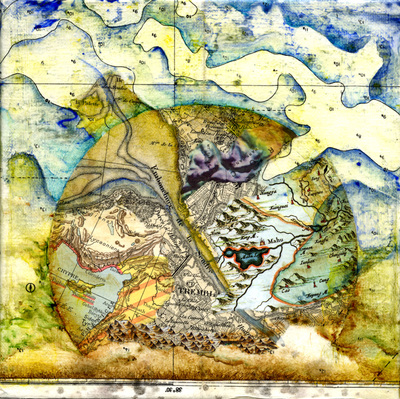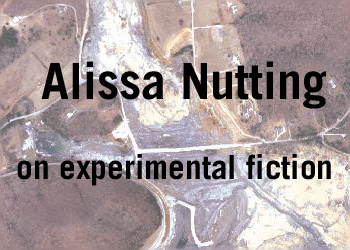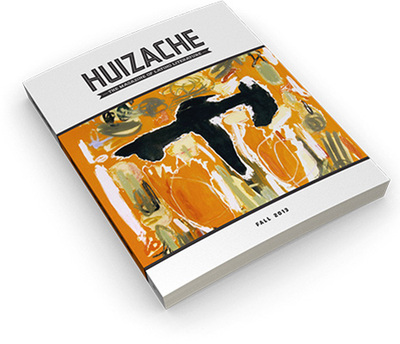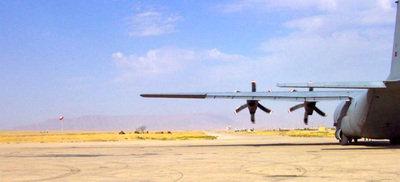Hector Donovan-Gonzalez
Please, Bosnia–Please this is Bosnia!
I want to see it all, I want to see grey morph into the thick drippings of ash and I want that to become the ground. Green has become the ground’s eczema, the outer flesh’s warbling groop. Sticky but not strong. I want the haziness of the lingering air (not the high-sky but the sky that exists around you, around me, just above the ground) to fall like a collection of little dots going kaputt. And I want it to be at the old bobsled track. It has to start at the bobsled track––it’s only been there, only there and nowhere else. This is essential. The track cannot be hidden amongst the glowing mass of moss and things. If something has life then it should reflect that with the tiniest speck of a yellow blink. The track wants to hide everything with growths of teeth and fungal matter. We can bring it back, we can show them all how this happened.
But it has to start there. It was built in the forest to become our home of war. It was our big mama whale belly. We looked for the blubberiest thing we could find in the forest––and, you know, there’s not much––so we settled on the bobsled track. The Enemy was a big boy bandit, or maybe something worse but that’s not as important to me right now, you know? And personally I can’t think of anyone more despicable than a thief––whether it be a man or child. Through dense jungles of wires, trees, daytime and nighttime, they broke through it all with tanks and gunpowder. A smoke flower plumaged, with the blooming petals leaching onto all the furniture down there. They said that the smoke remnants flew for miles. That their guns weren’t like our guns. Our guns flash bang stop. Theirs crater everything away.
The sky’s stiff moan turns everything to mud. People, mud, footsteps, mud, mountains and trees all mud all mud everything has changed to mud. The muddy march of the Enemy appears over the mountainside. The soldiers are ready, firing away with their stick rifles at the men and their tanks. And the blank stares of the battlefield ensures that only one thing was on the collective consciousness. To aim and to fire, to defend this bobsled with burning life. And when one dies, they too turn to mud. Bodies shift through solid, liquid, solid again, until finding an equal meeting point. The bones loosen, their jaws slack. The skin slips away down, pile after pile of green-grass mud.
Bobsleds become trenches when the air becomes brutal. You could find a thousand men in that pipe and still have enough room for the both of us. And a thousand men there are. Were. Two hundred men maybe could also be a thousand. They have black hair, all of them, black unruly hair. Beautiful in that raw image. All of them with a rifle, some kind of cross between a Kalashnikov and a stick. All of them with homes, too, I suppose. I mean, well,
I’ve actually never met a Bosnian to be honest.
Well, that’s a lie. There was this one guy that I helped sign up at the gym––he was way-too-tall for his way-too-thin mustache––and he was Bosnian. But aside from that, no I haven’t met one. Not even close to meeting, you know, a soldier or anything. But I’ve read a lot about it. I’ve read a lot about it for years and thought it’d make an interesting concept. We don’t get a lot of material about that kinda stuff over here in the states.
In my research of the Bosnian War I’ve read a handful of internet articles, interviewed a few men alive in the 90’s, and visited my local V.F.W. I always thought that name was odd. ‘Veterans of Foreign Wars’––isn’t every war foreign except for the civil war? Except technically the Confederate States of America was a different America, so if you were in one of those Sherman brigades that went tearing, tying, burning up every railroad that sleeps on grass, you’d be in a foreign war. Why not just Veterans of War or ‘Veterans’? I wanted to ask them this, but instead I asked them about Bosnia. I asked them about Niko.
They told me about their mustaches and white hairs and spots under their hairs and how they have no clue where the hell Bosnia even is. “We fought in Vietnam” they said, “is Bosnia in Vietnam?”
These guys probably don’t even know the meaning of Indochina. I’ve found that the key to understanding people is within the former names of their places. I can see it all. I can see pianos fallen, key upon key blasted apart, running on empty streets with buried landmines. And I can see the sniper’s glass glare, the hot white light which seethes the sky. The heat from a rifle’s window is much like a magnifying glass on anthill, an order to stay inside and stay home. The world is hot––seared by seer’s eyes. I know all this because I know that Bosnia used to be called ‘Yugoslavia’.
I’ve spent the majority of the past few months searching for Niko. I told the rest of the team that he’s the missing piece. The designers, programmers, company heads and all––they’re all waiting for Niko. He’s our son and doesn’t even know about it. The artists already have the enemy ready––you know, we kinda lucked out there. The company’s national representatives were unsure how guys from some country that nobody cares about could be cared about enough to be hated. “That’s the perfect situation,” I tell them. The Srpska fits the role of the villain all too snug. Niko’s more or less an instrument or an inheritance. It’s a title. Like how in Spanish class I learned that teachers are known as “The Professor Novak” and not just “Professor Novak.” Niko is a title––in honesty, I found the name from looking up popular balkan names, and I found Niko at the top of the list. The name rings the grease of black hair and dirt of the pebble road. I think all soldiers are probably like this, beautiful in that raw image. I tell this to the artists, the ones with nimble hands and stiff fingers––fingers with frostbite that can work for two-days straight. They nod in agreement. They say that kind of design comes naturally to them. They say it’s just like the last game we made. So we took the protagonist’s model from our previous game, removed the grizzly-bear beard and the subplot revolving around his wife’s death. I wanted to innovate this time. I wanted to do something different. “Don’t make his wife die,” I said to the writers, “Make it his girlfriend.”
The artists say the easiest part of the game will be the villains. The writers agree. Usually the wife-death is a good gateway for us, a path for a humble, sarcastic, cool-as-ice and tough-as-brick shitkicker to care about something. You could have a man fight against a nation from halfway across the world, with no conflict of faith, interest, or philosophy between them, but have them kill his wife and just have the plot right there. The villains this time, however, wouldn’t need that. The Srpska trampled all over Bosnia’s body and soul, in a way. I’ve never been to Bosnia, but my friend has, and we’re using him as our key consultant. Did you know that in Srebrenica, the Srpska would mold groups and groups of Bosnians into a building, lock the doors, and toss volleys of grenades through the window? My friend told me this, he told me that you can still see the shrapnel shell holes. I think Srebrenica will make a good level, and he agrees. The bomb-tossed stupor of the ground will provide ample cover, something that really screams ‘war is hell’, you know? I think it’d be a good place for Niko to develop an upgrade or two, as well. He’ll look vibrant there, with the sunbursting rockets, sparkling scarlet water. All ‘cause of a nation. I don’t know what a person as a country is supposed to look like, but I have the reference pictures to teach me. We don’t want the country, we want the villain. Take a general from the top-down and put hairs all over him, stub his legs and turn him ambiguously tan. My dad grows his beard long enough for people to be afraid of him. Something always clicks with hair growing in all their spots, like tangles and tangles of human mesh. Vines that rattle and hum through the ground, through the stones, all the way to Sarajevo.
I think it’s obvious that the crux of the game will take place in Sarajevo. The designers asked me if we had a hook, a big, addictive sell. Something that we can pack into the trailers, the billboards, something that we can shimmer up with spotlights and war cries and trumpets. And I laughed, it was like they haven’t even heard of the Bosnian War before. “Of course we do,” I said, “We have Sarajevo.” Part of the reason I chose the Bosnian War is because of how great the Siege of Sarajevo would make in terms of gameplay. You know, you could pick any number of wars and just flop. The Nagorno-Karabakh war, for example, what would that even be? What would that let you do––de-mine the Azerbaijani border? There needs to be stronger rain, there needs to be a hailstorm. There needs to be a Sarajevo––far off, demolished, archaic, and not New York. No one wants to play as a fucking New Yorker.
Now Niko moves by turning his tendons into threads. They are the only things thin enough, fleeting enough, to fit between the cracks of the air. Sarajevo is congested in all corners. The buildings leak dust, looking for the right moment to topple over and take whoever’s below with ‘em. I think that the country’s fallen under constant night. I think that whoever is doing everything else to them, did that. Blot out the sun? Go over it with a marker? Threw a towel on it. All the light comes from the remaining street lamps and the megalithic creature of downtown. It’s head is jellyfish-shaped, bouncy and neon. The cranium is all see-through, bubbling big glass holding a football-shaped skull. A football that’s a bit longer. A football that’s a bit bigger. A football that looks like if you took a football, beat it, stretched it out, ran it over with a train, and then maybe another train, and put it into the head of a monolithic jellyfish-man-monster.
The wires of the jellyfish monster’s head flash with each movement. Niko sees it well amongst the static of his screen eyes. His skin is translucent, too, so he can keep an eye on how much blood he’s got. He can tell by the redness if he can run a bit more. If it starts to look like a mushy apple, then he should probably go sleep somewhere. But now, it’s bright, bulging like a big fuckin’ tomato, and he wants to kill that god damn jellyfish beast. Sometimes his blood gets so ripe that he thinks the veins are coming out all together. Like they’re wrapping around his arms in winding vines. When this happens, he loses a lot of blood and passes out with regularity, but he doesn’t think much of it. He thinks about that big jellyfish beast. He thinks about what it’d be like to jump on its head. To plunge through the top of the rubbery skull, to cover himself in those bright wires of his brain. Niko would swim there for a bit, in the jellyfish brain milk, just to make the monster smell weird. Just to make him smell more human. And then he’d beat him up. Beat him real good. That’s what this is all about, after all.
And the tanks and the thunder, all those metal bits tearing the world asunder, where did it go? It must be here somewhere. I see a handsome boy fighting a jellyfish beast. It is still Bosnia. It is what lands, and in twenty years or so maybe this is all we’ll have. We’ll have a generation of memories that exist within this space that the Bosnian war was about one person’s fight against jellyfish monsters, all to protect those who he loved. We’ll know of every Bosnian as handsome––but unassuming––everymen who could be you, me, or your brother if they had more courage. Bombed-out villages will only matter if Niko runs by it, or if he lives there. But he won’t live there. He’ll be the only Bosnian you ever need, the only one you’ll ever meet. He’ll be a whole country, a whole war, a whole ton of pain and he won’t ever really exist. He’ll live in the archaic musical ruin of Sarajevo, the sexiest place of all. And the snipers, the men who sat in towers to shoot children, shoot people who weren’t children, and, well, really just shoot anyone who wasn’t them, will be replaced by a singular pulsating mass of jellyfish tentacles.
Copyright © February 2021 Liam Mejia

Hector Donovan-Gonzalez is a Mexican-American writer working and living in New Jersey. He is the recipient of the 2020 William Paterson Underground Creative Writing Contest for Fiction. He is a known friend to many spirits and buildings.









